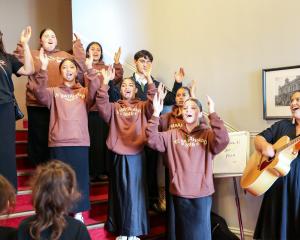By 1876, Oamaru had grown into a service centre for the agricultural-pastoral hinterland between the Kakanui Mountains and Waitaki River.
Its settlement in the 1860s, and accompanying influx of trade and settlers, meant the port became the hub from which domestic and commercial buildings grew.
A breakwater, extending far enough to protect shipping, was built by 1875 after the establishment of the Oamaru Dock Trust in 1869.
In the Oamaru Rowing Club's centennial booklet, released in 1986, then president Tony Mullally described how the alteration of the environment in turn shaped the burgeoning working class.
"Cultural organisations catered mainly for the few and there seemed to be little to attract the working man, who could neither afford nor appreciate the higher class of entertainment available," he wrote.
"The lot of the average worker must have been exceedingly dull. Sporting facilities were few and often poorly patronised.
"It was only natural that residents of a port should find their sport on the waters.
"Men, whose occupations took them about in boats, found themselves vying with one another in tests of skill in rowing."
Still, the club operated in relative anonymity on a national level until late in the 1950s, when a man known as Rusty Robertson changed everything.
Under his stewardship, the club improved from a record-tying six wins in Otago competitions in 1957 to 48 wins three years later.
Club stalwart Stewart Mitchell, whose association with the club began with the 1956-57 season, said the pivotal moments in its evolution came between March and Easter in 1958, when Rusty took the squad to train 35 minutes north of Oamaru at the Waihao box, which had been built by farmers to prevent flooding.
The course was more suitable than the shorter Oamaru Harbour, which Mr Mitchell said only allowed for 23 minutes of rowing per hour on the water because of the number of turns which had to be made.
At the New Zealand Nationals in 1958-59, the young Oamaru four, including Bill Smedley and Keith Heselwood, shocked onlookers by, in a borrowed boat, beating a Hamilton crew coached by Bill Eaddy.
Hurried questions and furtive glances shot around Lake Waihola that day after the club captured national titles, Mr Stewart said.
"Who are these guys? Who coaches them? And where the hell is Oamaru anyway?"
They were soon to find out.
Three short years later, an all-Oamaru crew of Smedley, Heselwood, George Paterson and Douglas Pullman won gold in the men's coxed four at the 1962 British Empire and Commonwealth Games in Perth.
Rusty accompanied the team but not as its coach, with funds for his passage raised in a single day by the people of Oamaru after mayor Bill Laney called a public meeting.
The fire siren echoed around Oamaru in triumph when word filtered through the radio of their triumph, and a huge reception greeted the rowers on their return.
Ten years later, at the 1972 Olympic Games in Munich, the men's eight, coached by Rusty, and including his nephew and Oamaru club member Gary Robertson, won gold.
The Kiwis on the dais, who had been expecting to hear God Save the Queen, were overcome and wept when God Defend New Zealand was played instead.
Rusty was lured to Australia in 1976, but left behind a strong coaching legacy which ensured the club captured many national titles.
The 125th anniversary celebrations began at the Oamaru Rowing Club last night, and will be followed by a light row in the harbour and barbecue lunch today.
A dinner for more than 100 people - including Athol Earl and Fred Strachan - will be held at the Oamaru Club tonight, and a photo session and barbecue is planned for 10.30am tomorrow.












